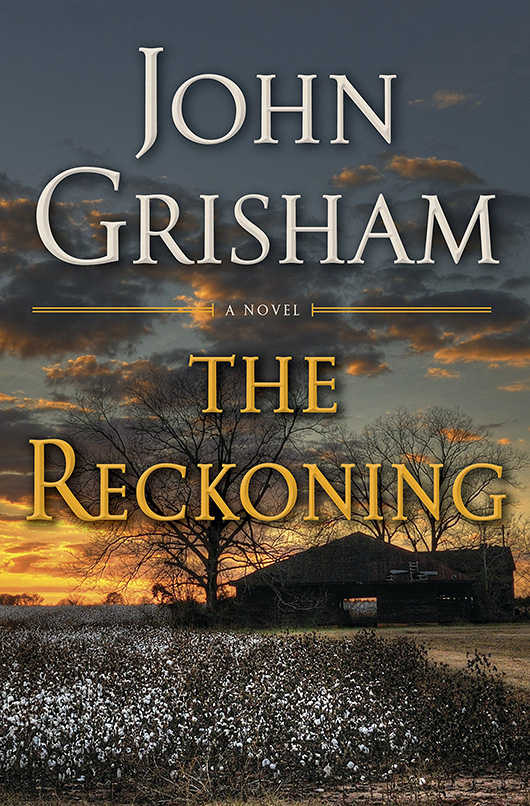A prominent farmer, war hero and father of two is on trial for murder in northern Mississippi. His hometown, Clanton, is aghast. If convicted, the electric chair awaits. If not, then a killer will walk free. The jury knows the heinous nature of the crime. They also know the sterling reputation of the defendant. No one, however, has any idea why he did it. Sounds like a John Grisham novel. And those are only the first three chapters.
“There’s a story I heard 30-odd years ago when I was in the state legislature in Mississippi where one day one prominent man drove into town and killed another,” Mr. Grisham said in an interview with the Gazette. “He never gave any reason for doing so, and was hanged on the courthouse lawn a year later. He took his secret to his grave. That struck me as a really powerful story. At the time, I was not a writer. I was not trying to write. I never dreamed of writing when I was 30 years old. But for some reason, I remembered that story. And I’d thought about it for years. I’d worked on it for years. Made notes, just kind of cultivated and crafted the story. And finally, I started to write it.”
Three decades, 30-plus novels, nine film adaptations, and over 275 million book copies sold later, Mr. Grisham has added The Reckoning to his already Leviathan-sized bibliography. With strong echoes of the southern gothic, the novel follows the trial of unexpected murderer Pete Banning in post-World War II Mississippi. Like the story Mr. Grisham heard 30 years ago, Pete Banning takes his secret to his grave. Unlike that story, it doesn’t stay there.
For Mr. Grisham, an author whose writer voice and real voice share the same stately southern twang, that is the power of fiction—the ability not just to tell stories, but to adapt them, expand them, and, ultimately, share them with others.
“Writers, we hear stories,” Mr. Grisham said. “And we steal stories. And we kick them around for years. And then, at some point, if they are really, really good, we fictionalize them. And then we call them our own. That’s what writers do.”
Writers also surprise. The first 175 pages of The Reckoning are classic Grisham: eclectic juries, Mississippi cooking, persnickety judges, legal loopholes, financial schemes, race-relations, love, loss and page-turning mystery in his quintessential, fictionalized northern Mississippi town of Clanton. The next 175 pages take place about 9,000 miles west on the island of Luzon during the Bataan Death March. There are no courtrooms. Justice, and struggle for survival, is meted out on the jungle battlefield.
“Yeah, that surprised me too,” Mr. Grisham said.
Although he knew his main character was going to be a war hero, and he knew he had to leave home and be presumed dead for the narrative to develop, Mr. Grisham didn’t know much about military history. In fact, he didn’t even know where Bataan was until he started his research. But once he started, he couldn’t stop. Of course, that’s a familiar feeling for anyone who’s read a Grisham novel. It was a little less familiar for the guy who writes them.
“The book really took a hard turn that direction when I began finding these stories written by the survivors of the Bataan death march,” Mr. Grisham said. “I probably have about 12 to 15 books written by survivors and there are a lot more than that. And they are all different...but they are all heartbreaking and they are all unbelievable. The more I read about what these guys went through, and the miracle of their survival, it just got richer and richer. So all I did was read these great books about 18, 20-year-old American boys who were fighting in a war on the other side of the world. It still fascinates me.”
Mr. Grisham can write a pure legal thriller in six months. It’s pretty much the only way someone can crank out just over 30 novels in just under 30 years. But for a novel like The Reckoning, which sits at about 150,000 words and 400 pages, rather than his ideal 100,000 words and 300 pages, Mr. Grisham had to do extensive research—not only for the parts of the book that take place in the Philippines, but for the parts in Clanton, too.
“The challenge with The Reckoning is that it is the only book I’ve ever written, out of a bunch of them now, that happened before I was born,” Mr. Grisham said. “So it was difficult to capture rural Mississippi in the 1940’s because I had never experienced it. And so I read some non-fiction stories set then. I caught myself reading William Faulkner...but small towns in the deep south, that’s my terrain. That’s where I’m from, and a lot of it comes natural.”
Setting is where the overlap in the Faulkner-Grisham Venn diagram both begins and ends. Whereas Faulkner delved into character and consciousness, with paragraphs of description and a dictionary for readers needed at the ready, Mr. Grisham’s stories never stray from what inspired them in the first place.
“It all goes back to a story,” Mr. Grisham said. “My books never start with characters. My books always start with...plots. And I never get too far away from plot.”
Mr. Grisham’s own story also happens to begin in a small, postwar Mississippi town. After drifting through odd jobs during his adolescence and early adulthood, Mr. Grisham earned a law degree and returned to his hometown to become a trial lawyer. He worked in the courtroom for 10 years before being elected to the Mississippi legislature, waiting and waiting for that big case. Eventually, it came. But Mr. Grisham didn’t get the chance to try it. Instead, he wrote it.
“Writing was not a childhood dream,” Mr. Grisham said. “It was not something I studied in college. It was not something I ever thought about doing until 1984 when I was 29 years old, and I got this idea for a courtroom drama in a small town in Mississippi very similar to where I was living at the time, and this big trial played out through the eyes of a young, idealistic attorney much like myself. I was a hungry, young lawyer and I was dreaming of a big trial.”
That book became A Time To Kill. It was a massive flop.
But over the three-year period it took Mr. Grisham to write A Time to Kill, he got in the habit of writing every day. It was a valuable lesson for him, and he wasn’t going to give it up so easily.
“I said, I’m going to write one more book,” Mr. Grisham recalled. “And if that doesn’t work, I’m gonna forget about this little secret hobby, and spend all my time suing people. The second book was The Firm. And that changed everything.”
The Firm was an overnight sensation, becoming the bestselling novel of 1991 and launching Mr. Grisham to worldwide literary stardom. With one book, he’d written himself out of the courtroom. He’d spend the rest of his career writing himself back into it.
Throughout the 90s, Mr. Grisham produced half a dozen more legal bestsellers, almost all of which became big budget Hollywood films. Although he hasn’t had a movie made in over 15 years, and laments the state of the current film industry, decrying the lack of adult dramas and the hundreds of millions of dollars spent to make “Spider-Man Ten,” the books keep coming—not just the ones he writes, but the ones he reads as well.
“Read,” Mr. Grisham said. “Read, read everything. The more you read the smarter you are. And also, if you are starting to write, the more you read the more you’ll see things that will inspire you to write. And if you are serious about writing, you’ve to do a page a day.”
Now, Mr. Grisham likes to spend his time in independent bookstores, chatting with novelists from all over the world. He’s done podcasts with Ian McEwan and Donna Tartt, and just finished reading Portnoy’s Complaint by Philip Roth. It’s his dream to meet John LeCarre. Even though Mr. Grisham uses the email pseudonym Sam Cahill (a character from his novel The Chamber) he said he never has to deal with the negatives of notoriety. That’s the beauty of being a writer.
“It’s not that level of fame,” Mr. Grisham said. “I laugh and tell people, I’m a famous writer in a country where nobody reads. Some people recognize the name, most people do not. And about once a year, somebody will stop me on the street and say, ‘Hey, aren’t you Stephen King?’”
On Sunday, August 4 at 9:30 a.m., John Grisham will participate in a discussion with Amor Towles.








Comments (2)
Comments
Comment policy »